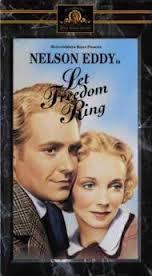
LET FREEDOM RING
US, 1939, 85 minutes, Black-and-white.
Nelson Eddy, Virginia Bruce, Edward Arnold, Lionel Barrymore, Victor Mac Laglan, Charles Butterworth, H.B. Warner,Guy Kibee, Raymond Walburn.
Directed by Jack Conway.
One wonders how this film was received in its time, after the depression, looking back on the history of the railroad, looking back at the capitalist bosses who exploited the workers, and released at the time of the outbreak of World War II in Europe. It is an odd experience for later audiences.
The principal reason for this is the presence of Nelson Eddy, so well-known as a singing partner with Jeanette Mac Donald in so many popular musicals of the 1930s, Naughty Marietta, Girl of the Golden West, Rose Marie, and partnering of stars like Ilona Massey and Eleanor Powell. On paper this is not a musical, it is rather a frontier story, of a big boss coming in to exploit the railroad, and buy people’s land, unscrupulously, setting fire to barns and paying low wages.
The film has a strong cast in its supporting roles, Edward Arnold always persuasive as an unscrupulous boss, Lionel Barrymore as the earnest fighter for rights, Charles Butterworth bringing some good humour into his role as Mackerel, a pianist but with an iron jaw when he challenges people for a dollar to punch him out and knock him out – but he always instantly rebounds. The Jesus of Cecil B. De Mille’s The King of Kings, H.B. Warner plays an unlikely character, a gentleman who runs the casino aspects of the local saloon, dignified but also handy with the gun. Virginia Bruce is the strong heroine. And Victor Mac Laglan is there, playing his usual tough role with Irish brogue and humour.
Into this context comes Lionel Barrymore’s son who has spent four years studying law at Harvard. He is expected to be the saviour of the community from the boss. However, when he returns, he goes through the play of siding with the boss, being in his good graces, doing his bidding – all of which bewilders and alienates his father, his girlfriend and the people in the town. His only confidante is Mackerel, the pianist, who helps him in his underground subversion of the boss, especially with the printing of a paper against the exploitation, which gets him the nickname of The Wasp. Because of his dedication, he is prepared for everyone to dislike him until the final revelation when everyone repents of their misjudging him.
This might be all right except that frequently, very frequently, Nelson Eddy finds the opportunity to burst into song. That makes the difference for this film. Obviously, he sings well, but the proportion of the songs on the action seems skewiff. On the side it offers an opportunity for some dancing, taken up with enthusiasm by Victor Mac Laglan. On the other side of the ledger, there are action sequences with Nelson Eddy, a bit of horseriding as well as a fisticuffs stoush with Mac Laglan.
The film ends with a confrontation in the hotel, the mine workers coming into support Nelson Eddy both being urged to go back to work by an ever more intolerant Edward Arnold. Just when it seems that the cause is lost, Virginia Bruce bursts into song, the patriotic song that stirs Americans and finishes with Let Freedom Ring.
The theme of the revolt against the exploitation by the railroad bosses is interesting in itself, but the style of the film makes it something of an odd experience.